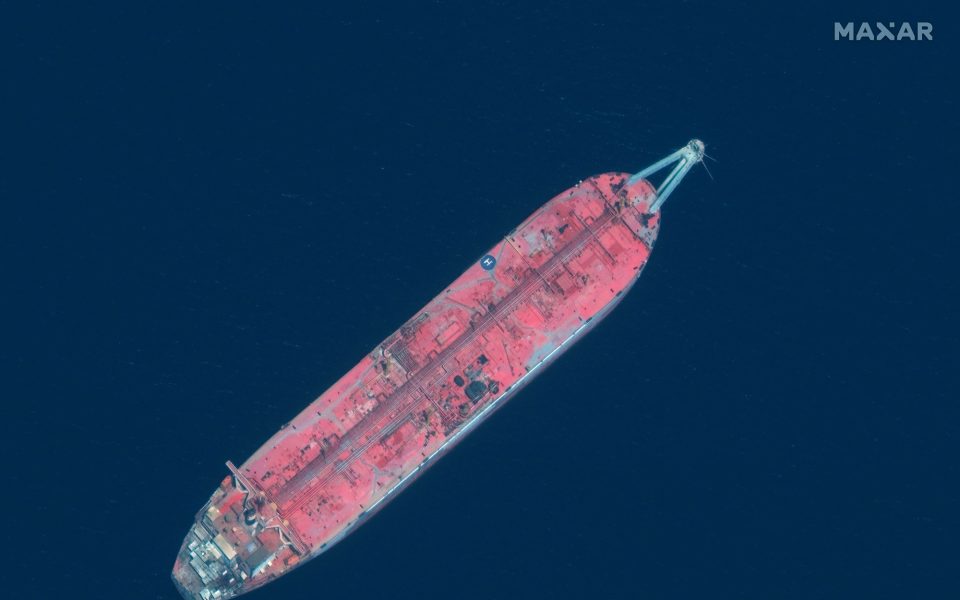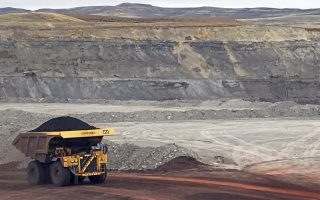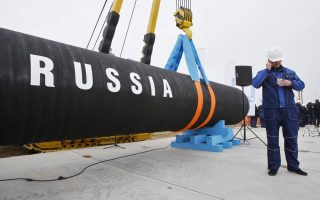An impending Red Sea disaster and Greece

As all eyes are trained on Ukraine, there’s another bomb just waiting to go off right in our backyard.
In less than a month, the international community will try to avert a devastating oil spill in the Red Sea that threatens global shipping, risks becoming the worst natural disaster ever seen in the broader region and triggering a new wave of migration.
Greece has just a few weeks to ensure its participation in this historical international effort at the heart of the most important sea passage in this region. But to understand what’s at stake, let’s go back a bit.
Yemen
For centuries, the Yemeni port of Hodeidah was a protagonist in the global coffee trade and a key commercial hub in the Red Sea. The aroma of coffee was snuffed out in Yemen, however, by the stench of civil war in 2011, when the newly elected president, Abdrabbuh Mansur Hadi, failed to hang onto power after his authority was challenged by Houthi extremists, who are backed by Iran.
A military intervention by Saudi Arabia to support Hadi came as no surprise, as the leader of the Arab world could not tolerate having its southern flank exposed to a country that was a puppet of its archrival, Iran.
On top of all this tragedy, the oil tanker Safer came along like a ticking time bomb that may act as the coup de grace for the long-suffering country of Yemen.
The threat
Stuffed with a load of more than 1 million barrels of crude oil, the aged tanker has lain abandoned and rusting off the coast of Hodeidah for the past five years. Its decaying hulk encompasses the complexity of the civil war in Yemen.
The Safer was permanently anchored off Hodeidah in 1987 and used for some four decades as a floating storage unit by Yemen’s state-run oil company to get oil from other tankers onto the mainland. However, the tanker fell into the hands of Houthi insurgents in March 2015 and has since then been – for all intents and purposes – left to rot. As a result, the structural integrity of the ship, which was built in 1976, is now at serious risk. Its firefighting system is out of order, and it has sprung several leaks over the past couple of years.
Impending catastrophe
Experts estimate that the risks of an explosion on the tanker are huge and that the impact of this would be massive, as a full-blown leak in the closed basin of the Red Sea would be four times bigger than the historic Exxon Valdez disaster of 1989. Under the worst-case scenario, all of Yemen’s Red Sea ports would have to shut down, depriving millions of people of food and life-saving humanitarian aid. A spill would also affect the country’s water supply by shutting down its desalination plants.
In a recent communication, the United Nations secretary-general’s special coordinator for Yemen, David Gressly, confirmed that “a major spill could also disrupt vital shipping through the Bab al-Mandab Strait and the environmental impact would reach Saudi Arabia, Eritrea, Djibouti and Somalia, depending on the time of year.”
The impact on sensitive ecosystems would be incalculable, while it would also disrupt shipping at key passes like the Horn of Africa and Suez. The closure of the Bab al-Mandab Strait, or even of the Suez Canal, would trigger daily losses of around $10 billion, as around 10% of global commercial traffic is conducted through these passages. It was a scenario the world already lived through briefly last year when the Ever Given container ship blocked Suez for six whole days.
Gressly has repeatedly stressed that a spill would destroy the lives of millions of people across the entire region. It almost goes without saying that such a crisis would also cause a fresh spike in immigration flows toward Europe.
According to the latest data from EU border agency Frontex, at least 16,000 migrants from areas around Yemen were spotted trying to enter Europe irregularly in the month of January. It is impossible to know exactly how big an impact on migration flows a spill from the Safer would have.
Moreover, experts say that dealing with a spill and cleaning it up will cost as much as $20 billion.
According to George Petropoulos, deputy head of the United Nations Office for the Coordination of Humanitarian Affairs (OCHA) in Yemen, “it is cheaper, prudent and safer to act now and prevent the worst from happening than to respond to the colossal and long-term environmental and economic consequences of a spill.”
The question is who will undertake the cost of around $75-100 million needed to defuse the Safer time bomb.
Petropoulos said the problem is that the resources for such an operation are not there, while noting that the international community needs to step forward to prevent such a disaster from happening.
Conference of donors
On February 16, the UN under-secretary-general for humanitarian affairs, Martin Griffiths, informed the Security Council of an agreement, in principle, for a UN-coordinated proposal to shift the oil to another ship.
Now all eyes are turned to the conference of donors that the UN is holding at the end of March, where various states are expected to offer money to bankroll the operation.
The Greek Foreign Ministry has been formally informed of the conference, and Greece must not fail to be present.
Why it’s important
The matter of the Safer concerns Greece on many different levels.
The country has been actively pursuing a return to a more essential role the Middle East and North Africa region. In the past two years alone, we supported Saudi Arabia’s air defense needs by sending a battery of Patriot missiles, we gave Egypt direct assistance in dealing with the Ever Given crisis and, just a few days ago, Foreign Minister Nikos Dendias announced a Greek donation toward the reconstruction of the port of Benghazi.
Moreover, if Greece wants to continue claiming a leading role in world shipping and to maintain the momentum of its increasing presence in the Middle East, it needs to support international efforts for the Safer.
The case of the Safer is the perfect opportunity for the Greek authorities to work with associations that have a stake in the continued safe passage through the Red Sea, such as the Union of Greek Shipowners. It could, in fact, serve as the first initiative of the historic union’s newly elected president, in cooperation with the Ministry of Foreign Affairs.
The operation will protect a crucial passage for Greek shipping and also avert a string of negative consequences which are expected to have an impact on society as well. It is a crisis waiting to happen that can and must be averted – and Greece must be part of the solution.
In contrast to Turkey, which usually tries to increase its political influence by causing problems, Greece is demonstrating how its international presence means an active presence in dealing with important issues with a global reach. It would be a shame for Turkey to be at the donors’ conference and not us.
Our participation in the conference would also bolster Greece’s bid for a spot as a non-permanent member of the UN Security Council in the elections of 2025.
Last but not least, at the tactical level it would be useful to tap into the network of experienced Greeks working in key posts at international organizations and humanitarian groups. There are many people who would like to provide support to the country’s international efforts from within their professional scope, but it is up to the authorities to identify them and to make that happen. Perhaps the Safer affair is well-suited to this too.
Nikolas Katsimpras is a lecturer in Columbia University’s Negotiation and Conflict Resolution Program, an international affairs consultant and a veteran officer of the Hellenic Navy.





